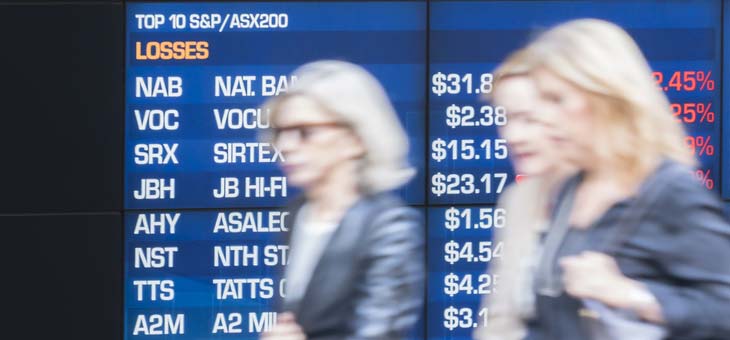Older Australians looking forward to a comfortable retirement are instead facing the prospect of working longer, losing swathes of super or being reliant on government assistance.
And many of those already retired also face a gloomy financial future.
They face a loss of more than $100 billion in vital income streams as the coronavirus crisis crushes superannuation, personal savings and share dividends.
Many self-funded retirees have already lost up to 30 per cent of their retirement savings at the outset of the pandemic when stock markets collapsed.
Some losses have been somewhat recovered. Some haven’t and may not come close. Many will see far lower returns for the foreseeable future. Those who once lived comfortably off dividends and franking credits will have a far lower income in the short term and possibly longer.
The stock market crash has forced many retirees to sell up to guarantee sufficient funds to live off for the near future.
And, for the first time, many once self-sufficient retirees will rely on the Age Pension and other forms of government assistance and tighten their belts until they can risk investing again.
And while some may have seen a glimmer of hope at the start of last week, by the end of the week the share market fell again for the first time in almost two weeks after recovering from March’s seven-year low.
Many self-funded retirees, such as Brisbane retiree David Warner, wait nervously to see which way the retirement rollercoaster goes next.
“We’re sitting on tenterhooks at the moment, just waiting to see what might happen,” Mr Warner told the ABC.
“We won’t know that until we know what the impact of the government removing its various levels of subsidies is.”
Like many other retirees, exposure to the share market can change longer-term plans to age in place rather than go into an aged care facility.
“The matter of having money and saving money is critically important to us,” he said.
“It’s not about saving so that we can spend it on new cars and overseas holidays.
“At our time of life, it’s very much about making sure that we have an adequate amount of money to provide us with a reasonable quality of care.”
Mr Warner and his wife Liz are one example of the many older Australians becoming increasingly vulnerable to the financial throes and fits caused by COVID-19.
According to the ABC, the Australian Tax Office (ATO) estimated that self-managed super funds lost $66.7 billion in the March quarter and dropped $28.6 billion when compared to March 2019.
“For many self-funded retirees, dividends paid from listed equities make up a substantial proportion of their annual income,” said Self-Managed Super Fund (SMSF) Association chief executive John Maroney.
“Combined with lower interest from bank deposits and possibly reduced rent receipts from property investors, many have experienced a substantial reduction in their income.”
Self-funded retirees are being left out of government stimulus assistance, say experts. About two million retirees receive no part of full Age Pension and about half of them rely solely on income derived from shares or super.
The impact on those who depended on share dividends need more support, says the spokesperson for the Alliance for a Fairer Retirement System, Ian Henschke.
The group calls for a lowering of the Pension Loan Scheme rate to encourage more people to use the program to top up their pension, a further reduction to the deeming rate, re-thinking taper rate changes introduced in 2017 that helped save billions in pension payments and expanding the eligibility criteria for the Commonwealth Seniors Card.
“What we’ve witnessed over the past four months has been a massive shock to the whole economic system, but what it has done is that it’s actually revealed the weaknesses in our retirement income system,” said Mr Henschke.
“The risk of retirement for many of them is carried by the individual and unless they carry with them one or two years’ worth of cash in the bank to ride over that shock, they have to sell their assets.
“What I think we should not forget is the role that older Australians play in the overall economy, because there are 3.8 million Australians in the retirement sector.
“If they are affected by this, then they won’t be spending money and that doesn’t stimulate the economy.”
The alliance, which represents millions of retirees and older investors, has written to key government figures urging reforms to measures previously introduced to relieve pressure from the federal budget.
It says the coronavirus pandemic has dramatically hit retirees to such an extent it now puts the nation’s economic recovery at risk.
“Retiree spending, and willingness to spend, will have critical impacts on the economy in any post-stimulus recovery phase,” stated the alliance in a letter obtained by The Sun-Herald and The Sunday Age.
“However, under the current market conditions, there is a risk older Australians will further withdraw from the economy, slowing the recovery. Retirees are unlikely to have the confidence to spend if they continue to face significant impacts on their income.”
The alliance fears the financial impact on retirees caused by the coronavirus “could extend for years”.
Do you think the government is doing enough to help retirees and older Australians?
If you enjoy our content, don’t keep it to yourself. Share our free eNews with your friends and encourage them to sign up.
Related articles:
https://www.yourlifechoices.com.au/retirement/news/how-to-keep-your-retirement-on-track
https://www.yourlifechoices.com.au/finance/superannuation/womens-financial-health-at-greater-risk
https://www.yourlifechoices.com.au/finance/superannuation/tax-raid-in-store-on-super-earnings

